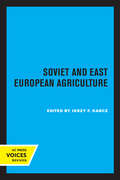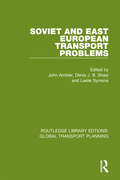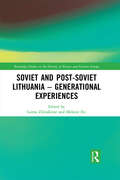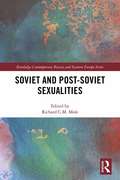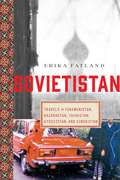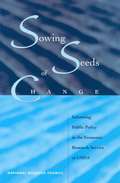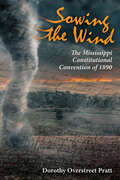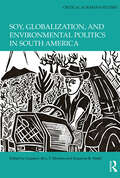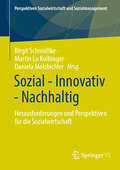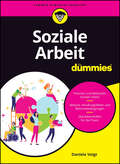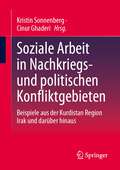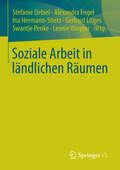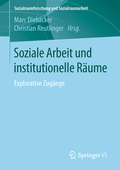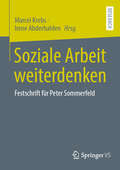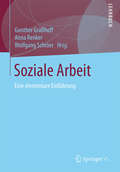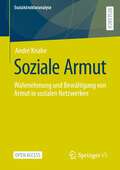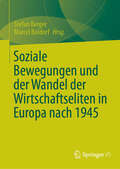- Table View
- List View
Soviet and East European Agriculture
by Jerzy F. KarczThis title is part of UC Press's Voices Revived program, which commemorates University of California Press’s mission to seek out and cultivate the brightest minds and give them voice, reach, and impact. Drawing on a backlist dating to 1893, Voices Revived makes high-quality, peer-reviewed scholarship accessible once again using print-on-demand technology. This title was originally published in 1967.
Soviet and East European Transport Problems (Routledge Library Edtions: Global Transport Planning #3)
by Lester Del ReyOriginally published in 1985, this book considers many important aspects of the transport systems of the former Soviet Union and Eastern Europe. It looks at the different modes of transport and the problems faced by each. Examining the relationship between transport problems and those of poor economic performance against the possibilities of economic reform the book analyses some of the measures which were taken to remedy the situation.
Soviet and Post-Soviet Identities
by Catriona Kelly Mark BassinSince the Soviet Union collapsed in 1991, questions of identity have dominated the culture not only of Russia, but of all the countries of the former Soviet bloc. This timely collection examines the ways in which cultural activities such as fiction, TV, cinema, architecture and exhibitions have addressed these questions and also describes other cultural flashpoints, from attitudes to language to the use of passports. It discusses definitions of political and cultural nationalism, as well as the myths, institutions and practices that moulded and expressed national identity. From post-Soviet recollections of food shortages to the attempts by officials to control popular religion, it analyses a variety of unexpected and compelling topics to offer fresh insights about this key area of world culture. Illustrated with numerous photographs, it presents the results of recent research in an accessible and lively way.
Soviet and Post-Soviet Lithuania – Generational Experiences (Routledge Studies in the History of Russia and Eastern Europe)
by Laima ŽilinskienėThis book explores the impact on different generations of Lithuanians of the fifty-year Soviet modernisation project which was implemented in Lithuania from 1940 to 1991. It reveals the specific characteristics of ‘the last Soviet generation’, born in the 1970s, and sets this generation apart from those who were born earlier and later. It analyses changes in attitudes, choices and relationships in a variety of social spheres and contexts and the adaptation skills which were required during the late Soviet and post-Soviet transformation processes. Overall, it presents a great deal of detail on the social experiences of different generations in late Soviet and post-Soviet society.
Soviet and Post-Soviet Sexualities (Routledge Contemporary Russia and Eastern Europe Series)
by Richard C.M. MoleDespite Soviet Russia having been one of the first major powers to decriminalise homosexual acts between men, attitudes towards lesbian, gay, bisexual and transgender (LGBT) people in contemporary Russia and the other post-Soviet states have become increasingly hostile, with the introduction of laws restricting their rights and an increase in homophobic violence. This book explores how this situation has come about. It discusses how meanings attached to non-heteronormative sexualities have been constructed for specific socio-political purposes by elites in line with Marxist-Leninist or nationalist thought, explores how attitudes to non-normative sexualities developed historically and examines the current situation in the post-Soviet space, including Russia, Transcaucasia, Central Asia and the Baltic States. The book provides a wealth of detail on this understudied subject and assesses how LGBT subjects are responding to this state of affairs.
Sovietistan: Travels In Turkmenistan, Kazakhstan, Tajikistan, Kyrgyzstan, And Uzbekistan
by Erika FatlandAn unforgettable journey through Central Asia, one of the most mysterious and history-laden regions of the world. Turkmenistan, Kazakhstan, Tajikistan, Kyrgyzstan, and Uzbekistan became free of the Soviet Union in 1991. But though they are new to modern statehood, this is a region rich in ancient history, culture, and landscapes unlike anywhere else in the world. Traveling alone, Erika Fatland is a true adventurer in every sense. In Sovietistan, she takes the reader on a compassionate and insightful journey to explore how their Soviet heritage has influenced these countries, with governments experimenting with both democracy and dictatorships. In Kyrgyzstani villages, she meets victims of the tradition of bride snatching; she visits the huge and desolate Polygon in Kazakhstan where the Soviet Union tested explosions of nuclear bombs; she meets shrimp gatherers on the banks of the dried out Aral Sea; she witnesses the fall of a dictator. She travels incognito through Turkmenistan, a country that is closed to journalists. She meets exhausted human rights activists in Kazakhstan, survivors from the massacre in Osh in 2010, and German Mennonites that found paradise on the Kyrgyzstani plains 200 years ago. We learn how ancient customs clash with gas production and witness the underlying conflicts between ethnic Russians and the majority in a country that is slowly building its future in nationalist colors. Once the frontier of the Soviet Union, life follows another pace of time. Amidst the treasures of Samarkand and the brutalist Soviet architecture, Sovietistan is a rare and unforgettable adventure.
Sow What?
by Girl ScoutsSow What will help you develop the leadership skills and confidence to create lasting change. As you explore innovative solutions, you'll be in good company. Across the country and around the world, girls and women are taking action to ensure that they, their families, and their neighbors have access to food that is healthful, affordable, and sustainable grown, which means it is produced with respect for the health of the planet and all who live on it.
Sowing Seeds of Change: Informing Public Policy in the Economic Research Service of USDA
by Panel to Study the Research Program of the Economic Research ServiceEvery day economic decisions are made in the public and private sectors, based on limited information and analysis. The analysis and information needed for successful public policy has changed rapidly with the growth of the global economy, and so have the means for acquiring them. In the public sector, decision makers rely on information gathered within government agencies, as well as the work of academics and private firms.Sowing the Seeds provides a case study of the need for analysis and information in support of public policy. It combines lessons learned from one of the first government agencies devoted primarily to this function with modern economic theory of organizations. The panel provides analysis and insight on:How and why public economic policy evolves with technological advances.The nature of information and analysis in support of economic policy produced in a government agency.The characteristics of successful information and analysis programs.Evaluating the work of a government agency providing information and analysis.Effective administration and organization of research and information programs in a government agency.Findings and recommendations in this volume will be of interest to managers and executives of research and consulting organizations in the public and private sectors, as well as to economists and policy makers.
Sowing the Wind: The Mississippi Constitutional Convention of 1890
by Dorothy Overstreet PrattIn 1890, Mississippi called a convention to rewrite its constitution. That convention became the singular event that marked the state's transition from the nineteenth century to the twentieth and set the path for the state for decades to come. The primary purpose of the convention was to disfranchise African American voters as well as some poor whites. The result was a document that transformed the state for the next century. In Sowing the Wind, Dorothy Overstreet Pratt traces the decision to call that convention, examines the delegates' decisions, and analyzes the impact of their new constitution.Pratt argues the constitution produced a new social structure, which pivoted the state's culture from a class-based system to one centered upon race. Though state leaders had not anticipated this change, they were savvy in their manipulation of the issues. The new constitution effectively filled the goal of disfranchisement. Moreover, unlike the constitutions of many other southern states, it held up against attack for over seventy years. It also hindered the state socially and economically well into the twentieth century.
Soy, Globalization, and Environmental Politics in South America (Critical Agrarian Studies)
by Susanna B. Hecht Gustavo de L. T. OliveiraSoy in South America constitutes one of the most spectacular booms of agro-industrial commodity production in the world. It is the pinnacle of modernist agro-industrial practices, serving as a key nexus in food–feed–fuel production that underpins the agribusiness–conservationist discourse of "land sparing" through intensification. Yet soy production is implicated in multiple problems beyond deforestation, ranging from pesticide drift and contamination to social exclusion and conflicts in frontier zones, to concentration of wealth and income among the largest landowners and corporations. This book explores in depth the complex dynamics of soy production from its diverse social settings to its transnational connections, examining the politics of commodity and knowledge production, the role of the state, and the reach of corporate power in everyday life across soy landscapes in South America. Ultimately, the collection encourages us to search and struggle for agroecological alternatives through which we may overcome the pitfalls of this massive transnational capitalist agro-industry. This book was originally published as a special issue of The Journal of Peasant Studies.
Sozial - Innovativ - Nachhaltig: Herausforderungen und Perspektiven für die Sozialwirtschaft (Perspektiven Sozialwirtschaft und Sozialmanagement)
by Birgit Schmidtke Daniela Molzbichler Martin Lu KolbingerDer Tagungsband zum 8. Fachkongress der Internationalen Arbeitsgemeinschaft Sozialmanagement / Sozialwirtschaft (INAS) an der FH Salzburg thematisiert aus sozialwissenschaftlicher Perspektive innovative, soziale und nachhaltige Ansätze der Sozialwirtschaft, um auf aktuelle gesellschaftliche Problemlagen zu reagieren und zukünftige Herausforderungen zu bewältigen. Die hier zusammengeführte sozialwissenschaftliche Expertise ermöglicht ein besseres Verständnis für die Bedingungen, Methoden und Wirkungen sozialer und nachhaltiger Innovationen.
Soziale Affordanzen der Thematisierung auf Medienplattformen: Vom Kennen über das Können zum Wollen bei der Setzung und Gestaltung von Themen (Medien • Kultur • Kommunikation)
by Charlotte KnorrIn der Kommunikation setzen und verhandeln wir Themen für uns selbst und für unser Gegenüber. In der Kommunikation auf Medienplattformen können sowohl journalistische und politische Akteure als auch die Nutzer*innen einzelne Themen spezifisch setzen. Jede*r könnte und jede*r kann Themen mit Hilfe der Techniken problematisieren, aufbereiten und verbreiten – zu jeder Zeit, dabei unterschiedlich relevant. Doch bedeutet allein die Möglichkeit zur Kommunikation auf Plattformen gleichzeitig auch die Möglichkeit zur Thematisierung für eine Öffentlichkeit?Die Arbeit nimmt sich einer bestimmten Schnittstelle von »Kommunikation« und »Medien« an: dem Gegenstand der »Thematisierung« auf Plattformen. Der Schwerpunkt liegt auf dem Formalobjekt der internetbasierten Thematisierung, welches aus einer techniksoziologischen Perspektive analysiert wird. Es wird untersucht, welche Formen von Thematisierung auf Plattformen technisch möglich sind und wie sie unter Mitanwesenden realisiert werden. Zur theoretischen Auseinandersetzung wird das Konzept der Affordanzen herangezogen. Themen werden affordanzanalytisch nicht nur gesetzt, sondern auch Plattformcharakterisch gestaltet.
Soziale Angemessenheit: Forschung zu Kulturtechniken des Verhaltens
by Bruno Gransche Jacqueline Bellon Sebastian Nähr-WagenerWarum und wie genau darf zu Hause oder auf einer Theaterbühne anders gehandelt werden, als im Büro; wie verändert sich die Bedeutung von Worten, je nachdem wo, von wem und wie sie gesagt werden? Warum und mit welchen Mitteln versuchen wir, höflich zu sein, und inwiefern sind wir von unangemessenem Verhalten anderer bedroht? Welches Weltwissen benötigen Beobachter, um beurteilen zu können, wann Verhalten als angemessen oder unangemessen einzustufen ist?Im vorliegenden Band untersuchen die Beitragenden das Phänomen sozialer Angemessenheit unter anderem aus philosophischer, sozialpsychologischer, soziologischer, kulturtheoretischer, linguistischer und anthropologischer Perspektive. Dabei werden insbesondere Bedingungen und Auswirkungen, Merkmale sowie Wandlungs- und Entstehungsprozesse sozialer Angemessenheit thematisiert.Die HerausgebendenJacqueline Bellon M.A. promoviert an der TU Darmstadt und arbeitet als Philosophin, Kultur- und Sozialwissenschaftlerin.Dr. Bruno Gransche ist Philosoph am Institut für Technikzukünfte (ITZ) des Karlsruher Instituts für Technologie (KIT).Sebastian Nähr-Wagener M.A. ist wiss. Mitarbeiter am Institut für Technikzukünfte (ITZ) des Karlsruher Instituts für Technologie (KIT).
Soziale Arbeit für Dummies (Für Dummies)
by Daniela VoigtSozial — Alles, was Sozialarbeiter schon immer wissen wollten Ein Buch für Studierende und Sozialarbeiter, das einen wunderbaren Überblick über das Thema gibt und dabei Theorie und Praxis verbindet. Sie lernen Hand-lungsfelder, Akteure und Rahmenbedingungen der Sozialen Arbeit kennen und gewinnen ein Grundverständnis von Methoden und Theorien. Zugleich erhalten Sie für Ihren Arbeitsalltag als Sozialarbeiter Survival Hacks und Überlebenstipps. Daniela Voigt erklärt verständlich und anhand vieler anschaulicher Beispiele, was Soziale Arbeit ausmacht und wie sie dazu beitragen kann, Menschen zu unterstützen, gesellschaftliche Probleme zu lösen und die Welt ein wenig sozialer und gerechter zu machen. Sie erfahren Was die Arbeit mit Menschen so speziell macht Welche Methoden Ihnen helfen, Hilfe zur Selbsthilfe zu geben Was den idealtypischen Sozialarbeiter ausmacht Wissenswertes über die Entstehung der Sozialen Arbeit
Soziale Arbeit in Nachkriegs- und politischen Konfliktgebieten: Beispiele aus der Kurdistan Region Irak und darüber hinaus
by Cinur Ghaderi Kristin SonnenbergDas Buch bietet einen einzigartigen Zugang zu theoretischen Ansätzen und praktischen Beispielen der Internationalen Sozialen Arbeit im Kontext von Kriegen und Konflikten. Leser*innen gewinnen Erkenntnisse über die Kompetenzen und die Rolle der Sozialen Arbeit, die dazu beiträgt, die Auswirkungen von Kriegen und Konflikten zu mildern. Das Buch wirft die Frage auf, wie Internationale Soziale Arbeit mit lokalen Ansätzen verbunden werden kann, und bietet Vorschläge für eine Entwicklung der Sozialen Arbeit im Hinblick auf den Austausch von Wissen und Erfahrungen zwischen dem Westen und dem Osten, dem Globalen Norden und dem Globalen Süden. Darüber hinaus wird die Rolle der Sozialen Arbeit bei der Verringerung des Problems der geschlechtsspezifischen Gewalt und bei den Methoden der Friedenskonsolidierung in Nachkriegs- und Post-Konfliktgesellschaften erörtert.
Soziale Arbeit in guter Gesellschaft (Kritische Erziehungs- und Bildungswissenschaft)
by Rita Braches-Chyrek Heinz SünkerDas Buch nimmt historisch-systematische Diskursbestimmungen in der Sozialen Arbeit als Disziplin und Profession vor. Die Voraussetzungen und Bedingungen für eine Soziale Arbeit, die sich ihrer politisch-gesellschaftlichen Verortung bewusst ist, haben sich aufgrund des Gestaltwandels hegemonialer Auseinandersetzungen im Kapitalismus in den letzten Jahrzehnten wesentlich geändert. Um zu begründeten Vorstellungen von „guter Gesellschaft“ zu gelangen, werden die Anfänge materialistischer Gesellschaftsanalyse und -kritik leitmotivisch aufgenommen und weiterentwickelt, damit eine zeit- wie gegenstandsangemessene Analyse für Klassenverhältnisse wie soziale Probleme und eine emanzipatorische Veränderungsperspektive entwickelt werden kann.
Soziale Arbeit in ländlichen Räumen
by Ina Hermann-Stietz Leonie Wagner Stefanie Debiel Gerhard Litges Swantje Penke Alexandra EngelSoziale Arbeit in ländlichen Räumen ist mit spezifischen Rahmenbedingungen und Herausforderungen konfrontiert. Dabei geht es u.a. um Angebotsdichte und Erreichbarkeit, Netzwerkbildung, Anonymität, verstärkte Abwanderung insbesondere aus peripheren Räumen, politische Strukturen oder Fragen von Zugehörigkeit. Forschungen und Konzepte zur Sozialen Arbeit in ländlichen Räumen sind jedoch Deutschland rar. In diesem Buch wird Soziale Arbeit in ländlichen Räumen historisch, theoretisch und organisatorisch betrachtet. Ziel ist es, eine Verständigung über spezifische Anforderungen an Soziale Arbeit in ländlichen Räumen zu finden und Hinweise und Anregungen für eine gelingende Praxis zu geben.
Soziale Arbeit mit alten Menschen: Ein Studienbuch zu Hintergründen, Theorien, Prinzipien und Methoden
by Anne Van Rießen Christian BleckDas Studienbuch bietet eine umfassende und differenzierte Einführung in die Grundlagen Sozialer Arbeit mit alten Menschen. Es beleuchtet aktuelle Entwicklungen sowie Hintergründe in Bezug auf die Lebensphase Alter und liefert umfänglich relevantes Wissen zu ausgewählten Theorien, Prinzipien und Methoden der Sozialen Arbeit – jeweils reflektiert für das professionelle Handeln Sozialer Arbeit mit alten Menschen. Für die Identitätsdiskussion und -entwicklung der Sozialen Arbeit mit alten Menschen bietet das Studienbuch vielfältige Impulse der Orientierung für Studierende und Fachkräfte sowie der Positionierung in der Scientific Community.
Soziale Arbeit und Antiziganismus: Dethematisierung und Deproblematisierung gesellschaftlicher Machtverhältnisse (Pädagogische Professionalität und Migrationsdiskurse)
by Carina BeckIn der empirischen Analyse von Gruppendiskussionen mit Sozialarbeitenden wird deutlich, dass durch vorherrschende Dethematisierung und Deproblematisierung antiziganistischer Machtverhältnisse in der Sozialen Arbeit diskriminierende Strukturen verfestigt werden. Obwohl Antiziganismus als spezielle Art des Rassismus bereits seit Jahrhunderten in Europa und darüber hinaus verbreitet ist, wurde der Umgang damit in der Praxis Sozialarbeitender bisher kaum erforscht. Dabei werden von Antiziganismus Betroffene in der stereotypen Vorstellung einer fehlenden Anpassung an gesellschaftliche Normen und dem Konstatieren von Unterstützungsbedarfen immer wieder zu Fällen Sozialer Arbeit
Soziale Arbeit und gesellschaftliche Transformation zwischen Exklusion und Inklusion: Analysen und Perspektiven
by David Kergel Mehmet Kart Bärbel Schomers Boris Friele Jens Rieger Katrin Sen Martin Staats Patrick TrotzkeDer Band leistet eine theoretisch fundierte und praxisnahe Perspektivierung sozio-technischer Transformationsprozesse im Bereich Sozialer Arbeit. Dabei stehen die Inklusionspotentiale sowie die Exklusionsdynamiken im Fokus, die sich aus den sozio-technischen Transformationsprozessen ergeben. Auch wenn der Analysefokus den Paradigmen der Sozialen Arbeit verpflichtet ist, sind diese Analysen weit über die Soziale Arbeit hinaus relevant: Als Form ethischer Praxis bietet Soziale Arbeit die Möglichkeit, alternative soziale Praktiken in einer zunehmend diversen Gesellschaft zu erproben, zu reflektieren und in breitere gesellschaftliche Kontexte zu stellen.
Soziale Arbeit und institutionelle Räume: Explorative Zugänge (Sozialraumforschung und Sozialraumarbeit #18)
by Marc Diebäcker Christian ReutlingerAngebote Sozialer Arbeit werden selten auf Basis ihres institutionellen Kontextes reflektiert. Mittels einer räumlichen Perspektive eröffnen die Beiträge besondere Sichtweisen auf Bedarfe von Klient*innen, fachliches Arbeiten des Personals und vielschichtige soziale Beziehungen ‚vor Ort‘. Anhand explorativer Fallstudien aus unterschiedlichen Arbeitsfeldern Sozialer Arbeit werden soziale Ordnungen im Inneren der Einrichtungen rekonstruiert, die auf territoriale und gesellschaftliche Ausschließungsprozesse verweisen. Werden Einrichtungen der Sozialarbeit/Sozialpädagogik als institutionelle Räume gedacht, dann ergeben sich vielfältige neue Aspekte und Impulse, um professionelle Praxen reflexiv weiter zu entwickeln.Der InhaltTheoretische Zugänge zu institutionellen Räumen Sozialer Arbeit • Forschungsperspektive und -programmatik zur Analyse Sozialer Arbeit in institutionellen Räumen • Frauenhaus als Schutzraum • Tageszentrum für wohnungslose Menschen als Abweichungsraum • Wohngemeinschaft von Kindern und Jugendlichen mit Behinderung • Gebauter und gelebter Raum in der stationären Suchthilfe • Offene Jugendarbeit als raumbildende Praxis • Geschütze Werkstätten als institutionelle Räume • Kindes- und Erwachsenenschutzbehörde aus sozialräumlicher PerspektiveDie HerausgeberDr. Marc Diebäcker ist Professor an der Fachhochschule Campus Wien.Dr. Christian Reutlinger ist Professor an der FHS St. Gallen und leitet das Kompetenzzentrum Soziale Räume.
Soziale Arbeit weiterdenken: Festschrift für Peter Sommerfeld
by Marcel Krebs Irene AbderhaldenDer vorliegende Band vereinigt Beiträge anlässlich der Pensionierung von Peter Sommerfeld. Sein Wunsch war, dass das Abschiedssymposium nicht primär geprägt sein soll durch Rückblicke auf sein Wirken, sondern dass gemeinsam nach vorne geschaut wird. Deshalb wurde die Veranstaltung unter das Motto «Impulse zum Weiterdenken» gestellt. Aus dem vielfältigen Schaffen von Peter Sommerfeld wurden drei Dimensionen ausgewählt, nämlich Profession und Professionsentwicklung, Wissenschaft der Sozialen Arbeit sowie Politik und Soziale Arbeit. Mit dem Ziel, die Soziale Arbeit weiterzudenken, wurde eine nächste Generation von Wissenschaftler*innen und Praktiker*innen eingeladen, diesen Faden aufzugreifen. So ist ein Band von inspirierenden Beiträgen entstanden, die zeigen, welch großes Potential das Werk von Peter Sommerfeld für die Weiterentwicklung der Soziale Arbeit hat.
Soziale Arbeit: Eine elementare Einführung
by Wolfgang Schröer Gunther Graßhoff Anna RenkerDas Lehrbuch ist eine elementare Einführung, die Soziale Arbeit in Kernbegriffen und Gegenständen für das Studium an Hochschulen aufbereitet. In kompakten und gut lesbaren Beiträgen erklären ausgewiesene Fachexpert_innen grundlegende Zugänge und Zusammenhänge. Ziel ist es, Studierenden einen strukturierten Überblick über die Basics des Themenfeldes zu geben und durch weiterführende Hinweise und Vorschläge eine intensivere Bearbeitung zu ermöglichen. Die ausgewählten Themen orientieren sich an gängigen Modulbeschreibungen grundständiger Studiengänge im Sozialwesen. Studierende erhalten gesichertes Grundlagenwissen zu allen relevanten Themen in einem Band und einen optimalen Einstieg in das Studium.
Soziale Armut: Wahrnehmung und Bewältigung von Armut in sozialen Netzwerken (Sozialstrukturanalyse)
by André KnabeIn diesem Open-Access-Buch wird die subjektive Wahrnehmung und Bewältigung von Armut im Kontext der strukturellen Einbindung der Betroffenen konzeptualisiert und erfasst. In einer reichen Gesellschaft arm zu sein, bedeutet nicht nur ein materielles Problem, sondern auch die Infragestellung der sozialen und gesellschaftlichen Zugehörigkeit der Betroffenen. Um dem zu entgehen, sind die Akteure auf voneinander abgrenzbare Kontexte in ihrem Netzwerk angewiesen, in denen sie Anerkennung und Teilhabe generieren können. Wer in dieser Lage auf sich selbst zurückgeworfen ist, erfährt Armut als die Zerstörung seiner bzw. ihrer Identität als respektables Mitglied der Gesellschaft. Der Kampf gegen die Armut darf daher nicht gegen die Armen geführt werden, sondern muss ein Kampf um Orte und Gelegenheiten sein, an denen wir zeigen können, dass es (auch) auf uns ankommt. Es zeigt sich, dass materielle Knappheit in Abhängigkeit der sozialen Einbindung unterschiedlich wahrgenommen wird. Die Bewältigungschancen verschlechtern sich, je weniger Gelegenheitsstrukturen zur Erreichung von Anerkennung und Teilhabe den Befragten in ihrem sozial-räumlichen Umfeld zur Verfügung stehen.
Soziale Bewegungen und der Wandel der Wirtschaftseliten in Europa nach 1945
by Stefan Berger Marcel BoldorfDieses Buch untersucht den Wandel der sozialen Bewegungen und der Wirtschaftseliten in Europa nach dem Zweiten Weltkrieg. In den Jahren nach 1945 stand Europa vor vielfältigen Herausforderungen, die durch die übergeordnete Frage verbunden waren, wie der Wiederaufbau des Kontinents vonstatten gehen sollte. Für die Mittelmächte lag die Umsetzung in den Händen der alliierten Besatzungsmächte, die den Prozess der Entnazifizierung und den Aufbau einer neuen Wirtschaftsordnung organisierten. In den Ländern, die nicht militärisch besetzt waren, bestand eine tiefe Kluft zwischen den neuen Regierungskräften und den ehemaligen Kollaborateuren. In beiden Fällen übernahmen soziale Bewegungen, die von Antifaschisten auf der linken Seite des politischen Spektrums gebildet wurden, die Aufgabe der gesellschaftlichen Neuordnung. Die Kapitel in diesem Buch untersuchen die Diskurse über die Wirtschaftssysteme und ihre Eliten, die in einer Reihe von europäischen Ländern in den Vordergrund rückten, und decken auf, wer daran beteiligt war, auf welche Widerstände diese sozialen Bewegungen stießen und wie es ihnen im Westen letztlich nicht gelang, einen Wandel herbeizuführen, während der Stalinismus in Osteuropa den Wandel gewaltsam erzwang.
